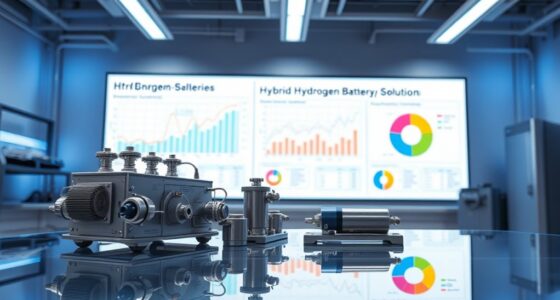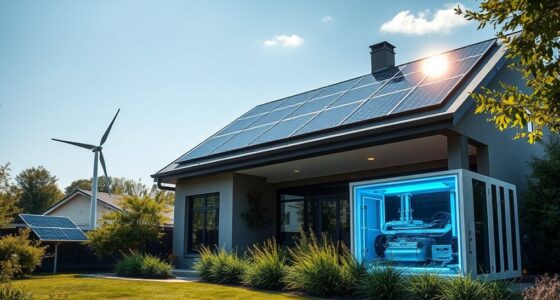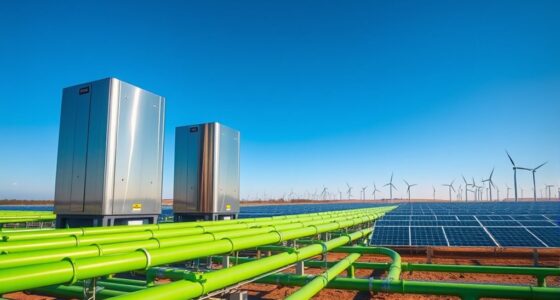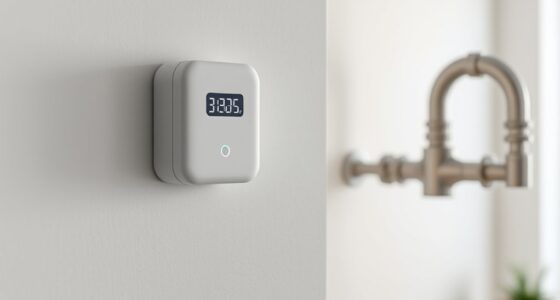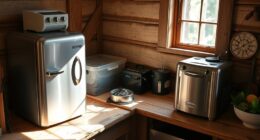Hydrogen generators powered by renewable energy offer a dependable, eco-friendly way to supply your remote cabin with clean electricity. They use solar or wind power to produce hydrogen through electrolysis, storing it for long-term use. This setup provides reliable energy during weather fluctuations and reduces reliance on traditional batteries or fossil fuels. If you want to discover more about how these systems can transform off-grid living, keep exploring the options available.
Key Takeaways
- Hydrogen generators can provide reliable, off-grid power for remote cabins using renewable energy sources like solar or wind.
- They store excess renewable energy as hydrogen, ensuring continuous power during fluctuations or seasonal changes.
- Hydrogen offers high-density, long-term energy storage, reducing reliance on batteries and fossil fuels.
- Advances in technology are making hydrogen generators more efficient, affordable, and scalable for various cabin sizes.
- Using hydrogen generators supports eco-friendly, sustainable living by reducing carbon footprint and enabling independent energy solutions.
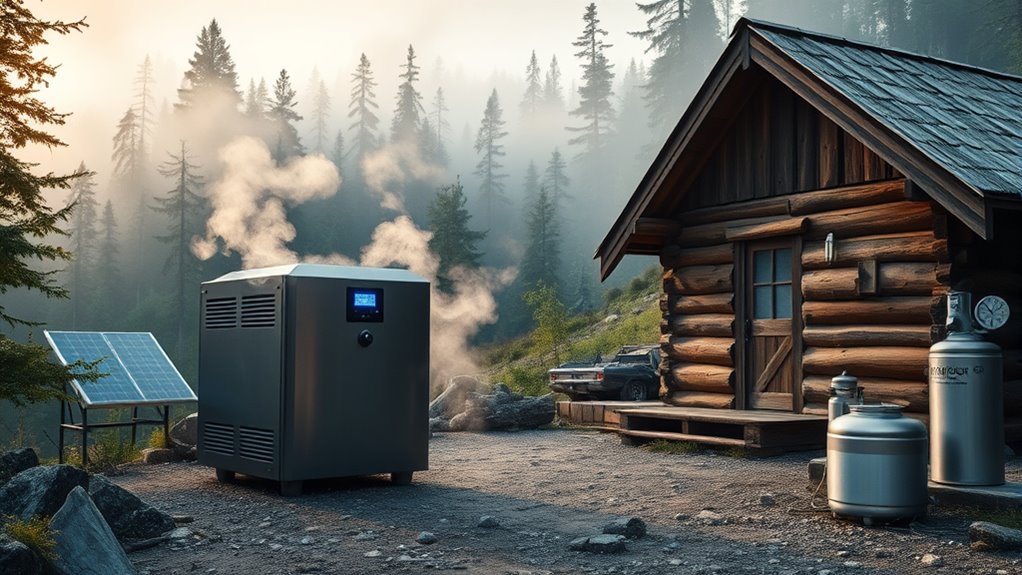
Are hydrogen generators the future of reliable power for remote cabins? This question has become increasingly relevant as more people seek off-grid living options that are sustainable and self-sufficient. Hydrogen generators harness renewable energy sources, such as solar or wind power, to produce hydrogen through electrolysis. This process splits water into hydrogen and oxygen, creating a clean fuel that can be stored and used when needed. By integrating hydrogen generators into your remote cabin setup, you gain a versatile and eco-friendly energy solution that reduces dependency on traditional fossil fuels.
One of the biggest advantages of hydrogen generators lies in their role as effective storage solutions. Renewable energy sources like solar and wind are intermittent—they don’t produce power consistently. During sunny or windy periods, excess energy is generated, but when the weather turns cloudy or calm, power can diminish. This is where hydrogen comes in. Instead of wasting surplus energy, you can convert it into hydrogen, which acts as a portable, high-density fuel. When power demand rises or renewable sources are insufficient, you simply use the stored hydrogen to generate electricity on demand. This flexibility makes hydrogen generators particularly suitable for remote cabins, where access to the grid isn’t an option.
Hydrogen as an efficient, portable storage solution for intermittent renewable energy at remote cabins.
Additionally, hydrogen’s storage capabilities surpass many traditional batteries, especially over longer periods. Unlike batteries that have limited lifespans and can degrade over time, hydrogen can be stored for months or even years without significant loss of energy. This means you’re not limited by battery capacity or replacement costs, and you can maintain a steady power supply regardless of weather fluctuations. The use of hydrogen as an energy storage solution also aligns with the broader push toward renewable energy integration, making your cabin more environmentally friendly.
Furthermore, hydrogen generators are scalable and adaptable. Whether you’re powering just essentials or a more substantial setup, you can size your hydrogen system accordingly. As technology advances, these generators are becoming more efficient and cost-effective, making them increasingly accessible for remote cabins. They also eliminate the need for large, bulky batteries, allowing for a more streamlined, less maintenance-intensive energy system. Overall, integrating hydrogen generators into your renewable energy setup provides a reliable, clean, and flexible power source that ensures your remote cabin remains functional in all seasons, regardless of weather or grid availability. As the push toward renewable energy continues, hydrogen offers an innovative path toward truly autonomous off-grid living.
Frequently Asked Questions
What Is the Average Lifespan of a Hydrogen Generator in Remote Cabins?
You can expect a hydrogen generator in remote cabins to last around 8 to 12 years, depending on maintenance and usage. Properly managing hydrogen safety and ensuring regular upkeep can enhance its durability. Keep an eye on key components and follow safety protocols to prevent issues. With good care, your hydrogen generator remains reliable, providing clean energy while minimizing risks, and extending its lifespan considerably.
How Much Maintenance Do Hydrogen Generators Require Annually?
While hydrogen generators are low-maintenance compared to traditional systems, you still need to plan for annual upkeep. You’ll typically perform maintenance frequency checks, monitor for leaks, and clean filters regularly. Troubleshooting techniques involve inspecting connections, testing sensors, and ensuring proper water quality. This proactive approach keeps your generator running smoothly, minimizing downtime and extending its lifespan, so you can enjoy a reliable power source in your remote cabin without surprises.
Are Hydrogen Generators Safe to Operate in Isolated Environments?
Hydrogen generators are generally safe to operate in isolated environments if you follow proper safety protocols and ventilation requirements. You should guarantee proper ventilation to prevent gas buildup, regularly inspect for leaks, and keep fire extinguishers nearby. It is crucial to understand the system’s safety guidelines and maintain good airflow. By adhering to these precautions, you can safely use hydrogen generators in remote cabins without risking health or safety.
What Are the Initial Setup Costs for Hydrogen Generators?
The initial setup costs for hydrogen generators vary based on size and technology but generally range from several thousand to tens of thousands of dollars. You should consider the cost comparison with traditional energy sources; hydrogen systems often have higher upfront expenses. Installation complexity can also influence costs, especially if specialized equipment or professional installation is needed. Budget accordingly and weigh these factors to determine if hydrogen generators fit your remote cabin’s needs.
Can Hydrogen Generators Be Integrated With Solar Power Systems?
Think of your energy setup as a symphony—you want all instruments in harmony. Hydrogen generators can definitely be integrated with solar power systems, enabling solar compatibility and efficient system integration. I know a remote cabin owner who combined solar panels with a hydrogen generator, creating a self-sustaining power source. This setup reduces reliance on external fuels and provides reliable energy, especially when sunlight wanes, making your cabin truly off-grid.
Conclusion
Imagine never worrying about power outages or running out of fuel at your remote cabin. Hydrogen generators provide a reliable, eco-friendly solution that could truly change how you live off-grid. Some say it’s too good to be true, but history shows innovation often starts with bold ideas. Embrace this technology, and you might just discover the freedom and security you’ve been longing for. Could hydrogen power be the future of remote living? Only you can decide.

